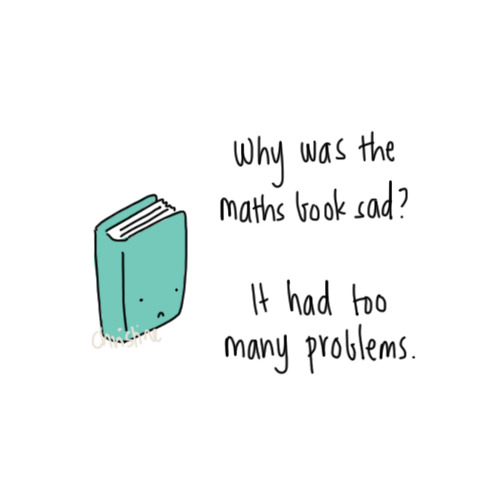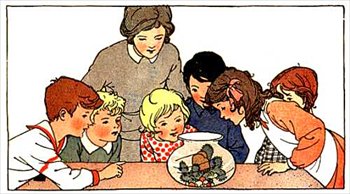Let's take a trip back in time...
Julia's Math Autobiography
A look at mathematics when I was in K-6:
I don't remember a lot of details about my math experience from K-6, but the ones that stand out are experiences that were from teachers in kindergarten and grades two, three, and six.
In kindergarten I remember learning to write numbers. Our teacher wrote great big numbers on chart paper. She described the numbers in easy to remember ways, such as the number five being a man's face with a hat on top. In grade two, I remember math lessons being very hands-on, such as predicting what shapes will roll, slide, etc. then testing our guesses by trying to roll them down a small ramp. In grade three, my memory is of flash cards and my peers and I standing in line in teams and guessing math problems on flash cards as quickly as possible. I remember there being a lot of pressure to answer as quickly as possible because our teammates would be yelling for us to win.
In grade six, and some of the earlier elementary grades, we had a lot of problem solving and learned different words for math symbols (and, sum, product, difference). I had a lot of difficulty with problem solving. I remember struggling and getting answers wrong but I did not get a lot of help or support from my teacher to learn the proper way to do the problems.
My best and worst memories about math:
I loved working with hands-on math activities such as shaped blocks, patterns, and the sticks and flats. These activities were fun for me and helped me learn math concepts. It was a positive enviroment. Really wordy math problems confused me and I would get frustrated and lose motivation. Even as an adult I still feel the same frustration and confusion with a lot of problem solving questions.
What I consider my math skills to be:
I was "good" and confident in my math skills up until grade six. I used to love doing math and I would spend long periods of time practicing my times tables and long division with my grandfather. When I was in grade six I started to struggle with math and felt embarrassed about not being able to do well on my tests. Since then I have thought of myself as being "not good" at math.
The role of my teacher in math classes:
My teachers were a mix of being fun and enthusiastic about math, and being very serious and disinterested in their attitude towards math. It was easy to tell who enjoyed teaching and who found it a chore.
My math assessments:
I always had math tests. The only forms of assement I can remember doing are minute math tests, mental math tests, and the "regular" math tests which were a mixture of short answers and problem solving.
My math experience in high school:
High school math for me was a terrible experience. Starting in junior high, my confidence in math decreased every year, especially one year when our replacement teacher decided to read everyone's math mark out loud because we all had trouble with the math test. I felt that many teachers didn't provide extra help and many of them would joke about people having trouble with problems. It was a struggle for me to do well and stay interested in math classes.
Math courses in university:
I took the math 1090 and math 1000 courses in university because they were required for some of the courses that I was taking. I didn't take any math electives, only the courses that were necessary for my program.
Math in everyday life:
I engage in basic mathematics in my life, such as math required for my job as a cashier/customer service position.
My feelings about math now:
I feel better about mathematics now, but there are still some concepts that I find difficult. When it comes to teaching mathematics in a primary or elementary class, I am excited to learn new ways to teach concepts and reflect and learn from my own experiences. I want to be an enthusiastic math teacher who is able to effectively answer students' questions and provide a safe learning environment.
Check back next week for more math blogging!

















